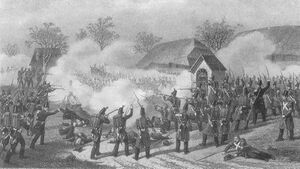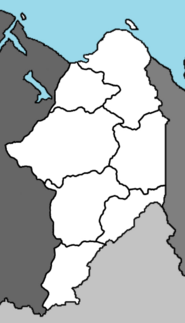Besmenian-Tinegardian War: Difference between revisions
mNo edit summary |
Neuleinster (talk | contribs) No edit summary |
||
| (One intermediate revision by one other user not shown) | |||
| Line 23: | Line 23: | ||
| combatant2 = *{{Flagicon image|Nortuan Union flag.png}} [[Nortuan Union]] | | combatant2 = *{{Flagicon image|Nortuan Union flag.png}} [[Nortuan Union]] | ||
| combatant3 = | | combatant3 = | ||
| commander1 = *{{flagicon|Kingdom of Besmenia}} [[ | | commander1 = *{{flagicon|Kingdom of Besmenia}} [[Wilhelm Friedrich]]<br/> | ||
*{{flagicon|Kingdom of Besmenia}} General [[Franz von Römerstein]] | *{{flagicon|Kingdom of Besmenia}} General [[Franz von Römerstein]] | ||
| commander2 = *{{Flagicon image|Nortuan Union flag.png}} King [[Gustaf I]]<br/> | | commander2 = *{{Flagicon image|Nortuan Union flag.png}} King [[Gustaf I]]<br/> | ||
| Line 50: | Line 50: | ||
''See also: [[Battle of Laitstadt]]'' | ''See also: [[Battle of Laitstadt]]'' | ||
In early February of 1850 the Besmenian | In early February of 1850 the Royal Besmenian Armed Forces marched towards the Heulania territorial capital of [[Laitstadt]], meeting resistance from Tinegardian militias. [[Gustaf I]] had became severely ill in late February of 1850, delegating military leadership to his son, [[Gustaf II]]. [[Gustaf II]] did not receive word of his military appointment until the Royal Besmenian Armed Forces reached [[Laitstadt]]. The defending militias (who were volunteers or conscripts at this point) in Laitstadt were poorly equipped and inadequately supplied to mount a defense against the Royal Besmenian Armed Forces. General [[Markus Nyhus]] was routed a year prior and unable to stage a breakout or counter offensive to relieve the city. The siege of Laitstadt lasted for two weeks until [[Gustaf II]] opened discussions for a peace treaty. | ||
==Aftermath== | ==Aftermath== | ||
Latest revision as of 13:18, 21 July 2024
| Besmenian-Tinegardian War | |||||||
|---|---|---|---|---|---|---|---|
 Battle of Laitstadt | |||||||
| |||||||
| Belligerents | |||||||
|
| |||||||
| Commanders and leaders | |||||||
|
|
| ||||||
The Besmenian-Tinegardian War was a war that began on October 28th, 1844 with the Besmenian invasion of Heulania.
Background
Between the years 1830 and 1840, the Nortuan Union created an eastern Nortuan empire which occupied the Heulania.
1844-1846: Western Heulania
1847-1849: Central Heulania
1850: Laitstadt
See also: Battle of Laitstadt
In early February of 1850 the Royal Besmenian Armed Forces marched towards the Heulania territorial capital of Laitstadt, meeting resistance from Tinegardian militias. Gustaf I had became severely ill in late February of 1850, delegating military leadership to his son, Gustaf II. Gustaf II did not receive word of his military appointment until the Royal Besmenian Armed Forces reached Laitstadt. The defending militias (who were volunteers or conscripts at this point) in Laitstadt were poorly equipped and inadequately supplied to mount a defense against the Royal Besmenian Armed Forces. General Markus Nyhus was routed a year prior and unable to stage a breakout or counter offensive to relieve the city. The siege of Laitstadt lasted for two weeks until Gustaf II opened discussions for a peace treaty.
Aftermath
See also: Besmenian-Tinegardian Treaty of 1850
The passing of Gustaf I marked the end of the Besmenian-Tinegardian War. Gustaf II signed the Besmenian-Tinegardian Treaty of 1850, ceding Heulania to the Kingdom of Besmenia.
